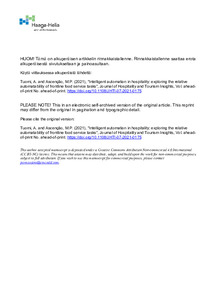Intelligent Automation in Hospitality: Exploring the Relative Automatability of Frontline Food Service Tasks
Tuomi, Aarni; Ascenção, Mário Passos (2021)
Tuomi, Aarni
Ascenção, Mário Passos
Emerald Publishing
2021
Julkaisun pysyvä osoite on
https://urn.fi/URN:NBN:fi-fe2021111956277
https://urn.fi/URN:NBN:fi-fe2021111956277
Tiivistelmä
Purpose
Automation poses to change how service work is organized. However, there is a lack of understanding of how automation influences specific sectors, including specific hospitality jobs. Addressing this gap, this paper looks at the relative automatability of jobs and tasks which fall within one specific hospitality context: frontline food service.
Design/methodology/approach
Study 1 analyzes the UK Office for National Statistics' Standard Occupational Classification (2020) data to determine the degree to which frontline food service jobs consist of tasks requiring mechanical, analytical, intuitive or empathetic intelligence. Study 2 contrasts these findings to current state of intelligent automation technology development through interviews and a focus group with food service technology experts (n = 13).
Findings
Of all the tasks listed under food service in the ONS SOC 2020, 58.8% are found to require mechanical, 26.8% analytical, 11.3% intuitive and 3.1% empathetic intelligence. Further, the automatability of these tasks is found to be driven by three streams of technology development in particular: (1) autonomous navigation, (2) object manipulation and (3) natural language processing.
Originality/value
Hospitality management literature has started to conceptualize a move from mechanical and analytical service tasks to tasks centered around intuition and empathy. While previous studies have adopted a general view to what this might mean for hospitality jobs, this paper develops a novel, task-centric framework for Actioning Intelligent Automation in Frontline Food Service.
Automation poses to change how service work is organized. However, there is a lack of understanding of how automation influences specific sectors, including specific hospitality jobs. Addressing this gap, this paper looks at the relative automatability of jobs and tasks which fall within one specific hospitality context: frontline food service.
Design/methodology/approach
Study 1 analyzes the UK Office for National Statistics' Standard Occupational Classification (2020) data to determine the degree to which frontline food service jobs consist of tasks requiring mechanical, analytical, intuitive or empathetic intelligence. Study 2 contrasts these findings to current state of intelligent automation technology development through interviews and a focus group with food service technology experts (n = 13).
Findings
Of all the tasks listed under food service in the ONS SOC 2020, 58.8% are found to require mechanical, 26.8% analytical, 11.3% intuitive and 3.1% empathetic intelligence. Further, the automatability of these tasks is found to be driven by three streams of technology development in particular: (1) autonomous navigation, (2) object manipulation and (3) natural language processing.
Originality/value
Hospitality management literature has started to conceptualize a move from mechanical and analytical service tasks to tasks centered around intuition and empathy. While previous studies have adopted a general view to what this might mean for hospitality jobs, this paper develops a novel, task-centric framework for Actioning Intelligent Automation in Frontline Food Service.
